Being and Truth
Studies in Continental Thought
EDITOR
JOHN SALLIS
CONSULTING EDITORS
Robert Bernasconi | William L. McBride |
Rudolf Bernet | J. N. Mohanty |
John D. Caputo | Mary Rawlinson |
David Carr | Tom Rockmore |
Edward S. Casey | Calvin O. Schrag |
Hubert L. Dreyfus | Reiner Schrmann |
Don Ihde | Charles E. Scott |
David Farrell Krell | Thomas Sheehan |
Lenore Langsdorf | Robert Sokolowski |
Alphonso Lingis | Bruce W. Wilshire |
David Wood |
Martin Heidegger
Being and Truth
Translated by
Gregory Fried and Richard Polt
Indiana University Press
Bloomington and Indianapolis
This book is a publication of
Indiana University Press
601 North Morton Street
Bloomington, Indiana 47404-3797 USA
www.iupress.indiana.edu
Telephone orders | 800-842-6796 |
Fax orders | 812-855-7931 |
Orders by e-mail |
Published in German as Martin Heidegger, Sein und Wahrheit
2001 German edition by Vittorio Klostermann, Frankfurt am Main
2010 English edition by Indiana University Press
All rights reserved
No part of this book may be reproduced or utilized in any form or by any means, electronic or mechanical, including photocopying and recording, or by any information storage and retrieval system, without permission in writing from the publisher. The Association of American University Presses Resolution on Permissions constitutes the only exception to this prohibition.
 The paper used in this publication meets the minimum requirements of the
The paper used in this publication meets the minimum requirements of the
American National Standard for Information SciencesPermanence of Paper for Printed Library Materials, ANSI Z39.48-1992.
Manufactured in the United States of America
Library of Congress Cataloging-in-Publication Data
Heidegger, Martin, 18891976.
[Sein und Wahrheit. English]
Being and truth / Martin Heidegger ; translated by Gregory Fried and Richard Polt.
p. cm. (Studies in continental thought)
ISBN 978-0-253-35511-9 (cloth : alk. paper) 1. Ontology. 2. Truth. I. Title.
B3279.H48S3713 2010
193dc22
2010005841
1 2 3 4 5 15 14 13 12 11 10
BEING AND TRUTH
CONTENTS
THE FUNDAMENTAL QUESTION OF PHILOSOPHY
Summer Semester 1933
The Fundamental Question and Metaphysics:
Preparation for a Confrontation with Hegel
) The relatio ad unum of essentia as perfectum.
The mathematical sense of the concord of the perfectum
) Metaphysics as logic in its higher form.
The logic of the logos as logic of the pure essentialities
ON THE ESSENCE OF TRUTH
Winter Semester 19331934
2. The question of the essence of essence.
Presuppositions and beginning
a) Daseins becoming essential in authentic care for its ability to be and the putting to work of the essence of things.
The how of essence
a) The long-accustomed conception of truth as correctness.
The agreement between proposition and thing
a) On the idea in the context of Platonic thought.
The priority of seeing and its broader concept
39. The essence of truth as historical mans struggle with untruth.
Untruth is posited with the enabling of the essence of truth
TRANSLATORS FOREWORD
Translators owe a double debt. To their sources, they owe fidelity. To their readers, they owe an explanation. Translators are intermediaries, and their work succeeds only if it can be trusted not to misdirect what they have been entrusted to convey. That responsibility is particularly pressing with a text such as Martin Heideggers Being and Truth.
While Heideggers language in Being and Truth is not as idiosyncratic as in his works of just a few years later (in particular, in the 19361938 Contributions to Philosophy), this text is challenging because of the diversity of its sources. Heidegger originally delivered the texts in this volume as a pair of lecture courses in 19331934, and as Hartmut Tietjen explains in his afterword, we have a variety of sources for what Heidegger actually presented: his own partial manuscript, his notes, and student transcripts. What this means is that the resulting text displays a wide range of styles: carefully prepared lectures that read like a book manuscript; transcriptions of what appears to be Heideggers more relaxed and sometimes loose delivery during the lectures themselves; and aphoristic, even cryptic passages that often only sketch out a train of thought. The reader should be prepared for sudden alterations in style.
In discharging our debt to the author, we have attempted to be as faithful as possible to the German by following a few simple principles. As far as we can, we have endeavored to provide consistent renderings into English of Heideggers terminology so that the reader may follow his usages as closely as possible. Because there is not always a one-to-one mapping of words and idioms from one language to another, truly literal translation is impossible, so the reader who wishes to pursue some of the complexities and connotations of Heideggers vocabulary should consult the GermanEnglish glossary at the back of the volume. Heideggers style is often very precise and carefully constructed; we have tried to reproduce this quality, even when a looser rendering in English might seem more elegant. But where Heideggers style is more informal, we have tried to capture the mood of the text with corresponding English idioms, so long as we could maintain fidelity to his meaning. In a number of cases where the text takes the form of grammatically or conceptually incomplete notes, we have formed complete sentences and attempted to spell out the sense. Whenever we have had to make decisions about missing words, our additions are enclosed in square brackets, as are all our notes and our translations of Greek and Latin terms. Readers should consult the editors afterword for an explanation of other typographical devices.
Some of Heideggers terminology is so specific to his thought, or to the intellectual and historical context of these lecture courses, that we owe the reader a more detailed explanation than we can offer in the glossary.
Sein and Seiendes. Heidegger insisted that his lifelong theme was the question of Being. We render Sein as capitalized Being in order to distinguish it from our rendering of Seiendes (and its permutations) as an individual being or beings in general. Seiendes literally means that which is or what is; we have used these phrases when they are not overly awkward. Some translations render Seiendes as entities, but the rather scholastic flavor of this word would diminish the freshness of many of Heideggers formulations in these lectures. As for Being, many translators resist this usage out of a concern that the capitalization will mislead some readers into believing that Being is a metaphysical principle, a sort of transcendent super-being that constitutes or underlies the reality of all other beings. But rendering both Sein and Seiendes as being can lead to serious confusions. In German, Sein is the infinitive to be turned into a noun. For Heidegger,


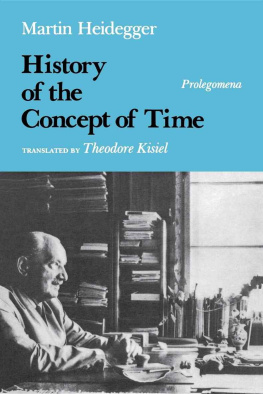
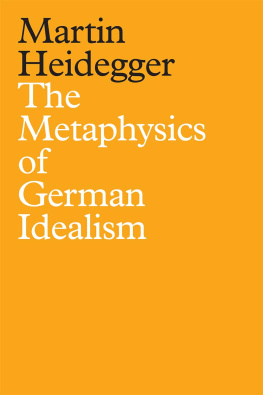
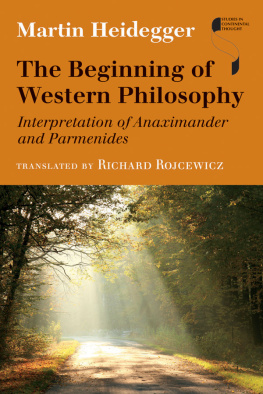
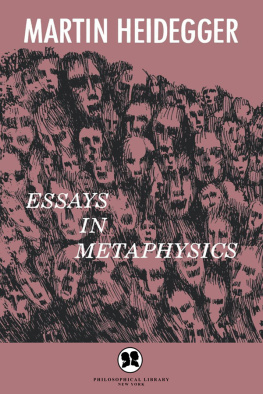
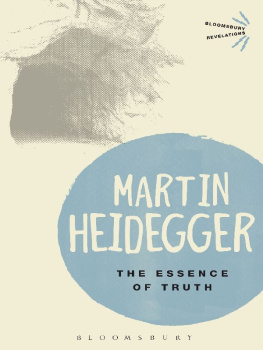
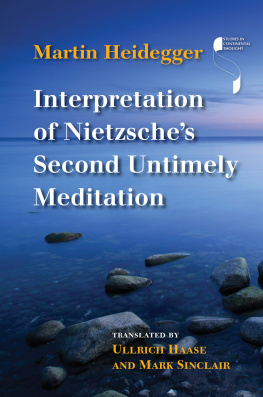
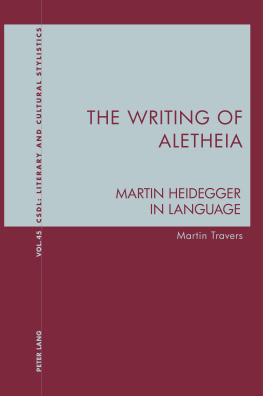

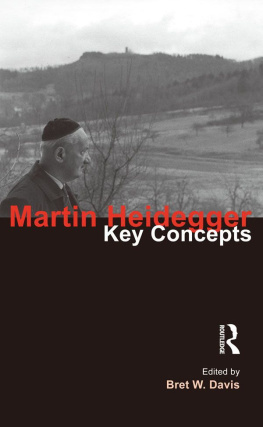
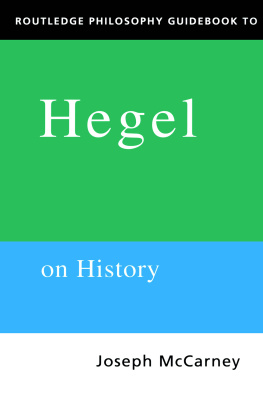
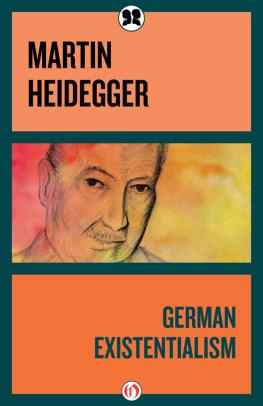
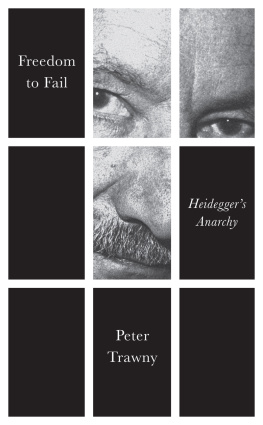
 The paper used in this publication meets the minimum requirements of the
The paper used in this publication meets the minimum requirements of the